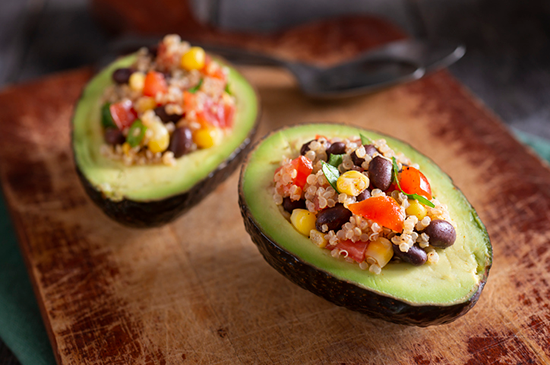You’ve likely read thousands of weight loss tips, and most of them seem focused on the eternal problem: How to lose weight without being hungry. Fad diets and questionable fitness gadgets may seem like a quick fix, but there are some tried-and-true ways to lose weight without feeling deprived or like you’re ready to eat anything within reach.
Here are seven ways to not be hungry and still lose weight.
1. Eat Good Fats

For decades, the diet industry was powered by the fear of all dietary fats, and some of us still aren’t over the misinformation. It’s worth saying again: Healthy fats can increase satiety (the feeling of fullness) by triggering appetite-regulating hormones.
“Fat does not make you fat! In fact, when quality and proportion are right, it does the exact opposite and prevents you from feeling constantly hungry,” says Kylene Bogden, MS, RDN, CSSD, CLT, IFNCP, a performance dietitian for the Cleveland Cavaliers who often has to help clients get and stay lean without feeling starved.
She recommends incorporating a serving or two of plant-based fat in every meal, like adding a spoonful of unsweetened peanut butter to oatmeal, topping an omelet with a scoop of guacamole, or using olive oil as the base for a homemade salad dressing.
2. Prioritize Fiber and Food Volume
Scott Keatley, MS, RDN, a registered dietitian nutritionist in New York City, says there are two things that every meal should include to help fill you up and keep you full:
“Look at your meal,” Keatley says. “Does your carb source contain any fiber? If not, try to swap it out for one that does, such as beans, whole grain products, or brown rice.” Fiber is not only satisfying, which may have an overall positive impact on body composition, but it also provides numerous health benefits.
And most of us don’t get nearly enough. The USDA recommends adults consume between 25 and 34 grams of fiber daily, depending on your biological sex.
Then comes volume: “Consider adding more low-calorie fruits and vegetables to your plate,” Keatley advises. Not only does extra volume help you feel full, but it also allows you to focus on what you can add to your diet instead of depriving yourself of foods.
3. Eat Enough Protein
“Protein helps repair your muscles after a workout, refueling them instead of allowing them to break down,” says Tami Smith, a NASM-certified personal trainer. “It also helps keep you more satiated throughout the day, which can lead to less snacking and fewer cravings. Proper protein consumption will allow for muscle maintenance while shedding excess fat.”
4. Drink Water Regularly and Between Meals

You probably know that drinking more water can help quell hunger pangs, but when and how much is optimal?
“I strongly advise all of my clients to start the day by drinking a glass of water and continue drinking about 8 ounces [one cup] every hour,” says Sylvia Melendez-Klinger, MS, RDN, LDN, CPT, a registered dietitian nutritionist in Chicago. “It’s important to drink between meals because it can keep you feeling full and well-hydrated. You’ll be surprised how this simple habit can help you eat far fewer calories than you otherwise would on a daily basis.”
To add flavor without racking up the calorie counts of bottled drinks, Melendez-Klinger suggests infusing water with fresh herbs or pieces of fresh fruit or adding a small splash of juice.
5. Eat Before You Feel Really Hungry
Plan meals and snacks to avoid scarfing unintentional calories. If you wait until you’re starving to eat, you’ll risk overdoing it, and feeling weak and ravenous might lead you to abandon your dieting efforts altogether.
“Avoid going longer than four hours without eating, even if it’s just a little protein-rich snack,” says Bogden. “Sporadic meal times may lead to extreme blood-sugar highs and lows. This can result in fatigue, hunger, and sugar cravings.”
6. Eat Mindfully
“Eating your feelings” isn’t just a cutesy phrase — it’s a major obstacle to weight loss for many.
“Many of us have a hard time distinguishing when we’re actually hungry versus just bored, irritated, or stressed,” says Paul Greene, Ph.D., a behavioral health psychologist in New York City who specializes in weight loss. “As a result, we come to believe we’re hungry when, in reality, we’re having an emotional experience.”
If you have an issue with emotional eating, try a delay tactic: If you feel hungry, wait 10 minutes somewhere food isn’t within easy reach. “If you’re still hungry after 10 minutes, then eat,” says Greene. “If you’re not, you’ve just learned something about differentiating genuine hunger from other experiences.”
7. Prioritize Quality Sleep

If you skimp on sleep, expect your hunger to rise the next day, whether you’re dieting or not.
“Not getting enough sleep messes with the production of ghrelin and leptin, two hormones that moderate hunger, appetite, and body weight,” says John Fawkes, an NSCA-certified personal trainer and Precision Nutrition-certified counselor in Los Angeles. “The better rested you are, the more likely you are to make smart dietary decisions — and work out.”

